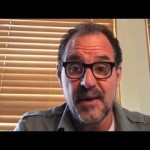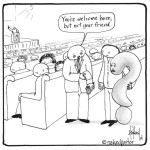We run our website the way we wished the whole internet worked: we provide high quality original content with no ads. We are funded solely by your direct support. Please consider supporting this project.

Giant Jesus
Yesterday’s post featured a video of Greg sharing about the role of the church in manifesting God’s character to the world. Here are some follow-up thoughts on that topic.
The NT often uses the metaphor of “the body of Christ” to describe the church. When Jesus walked the earth, he did so in an ordinary body, beginning with his birth in Bethlehem. Now he does not physically walk the earth, but the Church is his hands, mouth, and feet operating in the world today. The same life that was in his first body is in us, his second body. And we who belong to this second body take our marching order from the same “head” as Jesus’ first body.
This is why Luke begins Acts, which is a basic history of the early church, by reminding us that he wrote about Jesus in his gospel by saying “I wrote about all that Jesus began to do and to teach until the day he was taken up to heaven (Acts 1:1). To say that Jesus “began” to do certain things in his incarnate form implies that Jesus is now continuing to do certain things in a corporate form—through his Church.
In Luke’s mind, his Gospel was about what Jesus did through his first body, while the book of Acts is about what Jesus continued to do through his second, corporate body.
Luke sees the Church as a kind of giant Jesus.
In the book of Acts you can also see that Jesus identified with his corporate body. When Jesus knocked Paul off his horse on the road to Damascus, he identified himself as “Jesus, whom you are persecuting” (Acts 9:4). Since Jesus had ascended to heaven several years earlier, how could Paul be persecuting him? Clearly, he was doing so by persecuting the Church. Jesus apparently considered whatever happened to the Church as happening to him. Pain inflicted on his Church is pain inflicted on his body, as much as when spikes were driven into his hands and feet on the cross.
Paul wrote that we are to be “imitators of God” (Eph 5:1). The word for “imitate” (mimetai) literally means to “mimic” or to “shadow.” We are to imitate God’s every move, just as Jesus did.
Paul then fleshes out what this mimicking looks like in the following verse: “Live in love … as Christ loved us and gave himself up for us.” The body of Christ is to love others just as Christ loved in his own body, dying on Calvary for sinners.
The call to imitate Jesus is not something we can carry out with our own efforts. It’s a call to yield to the Spirit and thereby manifest the truth that Christ himself is working through us. He is transforming us into his image. He is working through his corporate body to carry out the work he began when he walked the earth.
In this way, we are a giant Jesus.
—Adapted from The Myth of a Christian Religion, pages 18-19.
Photo credit: iko via VisualHunt / CC BY-NC-ND
Category: General
Tags: Church, Discipleship, Incarnation
Topics: The Church
Related Reading

Signs of Hope
https://youtu.be/nl78l20AGP0 Greg taped this video for the Nomad podcast series called Signs of Hope. He discusses the hope he finds in the death of Christendom, and the rise in the beautiful new, peace-loving, non-violent, Jesus-centered, global movement.

The Purpose of the Church
Unlike most social groups, the relationships forged in the body of Christ are not ends in and of themselves. Rather, Christ calls us to unite with other believers for a unique purpose: to grow in, express and advance the kingdom revolution. We can gain clearer understanding of what the church is to be about by…

On Consumerism
Werner Kunz via Compfight As we enter the upcoming holiday season, most of us will be bombarded with advertisements attempting to convince us that what we have isn’t enough, that our lives are incomplete without the newest and most updated products, and that our main goal is to find the “perfect” gifts for everyone on…

Podcast: What if I Don’t Like Church?
Greg and Dan talk about what to do when we do not like church. http://traffic.libsyn.com/askgregboyd/Episode_0450b.mp3

Born Disciples: On Raising Kids to Follow Jesus
Article by Natalie Frisk In the sixth grade, I had a teacher named Mrs. Klompstra. She was enthusiastic about two things: math and physical education. Now, I realize that these two things may be a bit of an odd combination, but Mrs. Klompstra married the combo in a way that really impressed the love of…

